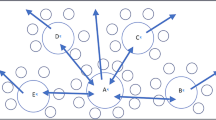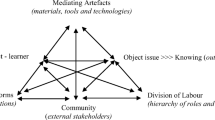Abstract
This paper reports the activity of three secondary school mathematics departments in England in self-initiated states of change that led to overall improvements in students’ achievements when compared to previous cohorts. This took place without intervention and without their participation in external projects. They provide examples of departments that can work effectively on their own development, and hence, their work adds to our knowledge of the potential for development through collaboration. The departments were monitored over 3 years, and data were analysed using the lens of activity theory. In contrast to departments in many studies, these departments worked overtly on mathematics pedagogy through the shared production and discussion of resources, shared planning and task design. Also in contrast to several other studies, they developed distinct ways to handle differences of subject knowledge among the teachers in the department. Their focus changed during the study from developing resource banks to supporting students’ learning through hybrid teaching.

Similar content being viewed by others
Notes
Our first task was to report what the departments did for a professional audience so we exploited the possibilities of multi-layered text on a website to report data summaries in fine detail (www.cmtp.co.uk).
See Watson and De Geest (2010) for more information about tasks.
For example: Association of Teachers of Mathematics (www.atm.org.uk); SMILE (www.nationalstemcentre.org.uk/elibrary/collection/44/smile); Cognitive Acceleration in Mathematics (www.cognitiveacceleration.co.uk/)
Abbreviations
- HoD:
-
Head of department
- HoDs:
-
Heads of department
- PLAS:
-
Previously low attaining students
References
Achinstein, B. (2002). Conflict amid community: The micropolitics of teacher collaboration. Teachers College Record, 104, 421–455.
Bakhurst, D. (2009). Reflections on activity theory. Educational Review, 61(2), 197–210.
Beswick, K., Watson, A., & De Geest, E. (2010). Comparing theoretical perspectives for describing mathematics departments: Complexity and activity. Educational Studies in Mathematics, 75(2), 153–170.
Boaler, J. (1997). Experiencing school mathematics. Buckingham, UK: Open University Press.
Britt, M. S., Irwin, K. C., & Ritchie, G. (2001). Professional conversations and professional growth. Journal of Mathematics Teacher Education, 4(1), 29–53.
Daniels, H. (2001). Vygotsky and pedagogy. London: RoutledgeFalmer.
Engeström, Y. (1998). Reorganising the motivational sphere of classroom culture: An activity theoretical analysis of panning in a teacher team. In F. Seeger, J. Voigt, & U. Waschescio (Eds.), The culture of the mathematics classroom (pp. 76–103). Cambridge, UK: Cambridge University Press.
Engeström, Y. (2001). Expansive learning at work: Toward an activity theoretical reconceptualization. Journal of Education and Work, 14(1), 133–156.
Grossman, P., Wineburg, S., & Woolworth, S. (2001). Toward a theory of teacher community. Teachers College Record, 103(6), 942–1012.
Kruse, S., & Louis, K. (1997). Teaching teams in middle schools: Dilemmas for a school wide community. Educational Administration Quarterly, 33, 261–289.
Lachance, A., & Confrey, J. (2003). Interconnecting content and community: A qualitative study of secondary mathematics teachers. Journal of Mathematics Teacher Education, 6, 107–137.
Leithwood, K., & Louis, K. (1998). Organizational learning in schools: An introduction. In K. Leithwood & K. Louis (Eds.), Organizational learning in schools (pp. 1–14). Lisse, the Netherlands: Swets and Zeitlinger.
Little, J. (2002). Locating learning in teachers’ communities of practice: Opening up problems of analysis in records of everyday work. Teaching and Teacher Education, 18(8), 917–946.
McLaughin, M., & Talbert, J. (2001). Professional communities and the work of high school teaching. Chicago: University of Chicago Press.
Melville, W., & Wallace, J. (2007). Metaphorical duality: High school subject departments as both communities and organizations. Teaching and Teacher Education, 23, 1193–1205.
Nickerson, S., & Moirarty, G. (2005). Professional communities in the context of teachers’ professional lives: A case of mathematics specialists. Journal of Mathematics Teacher Education, 8, 113–140.
Secada, W., & Adajian, L. (1997). Mathematics teachers’ change in the context of their professional communities. In B. S. Nelson & E. Fennema (Eds.), Mathematics teachers in transition (pp. 193–219). Hillsdale, NJ: Erlbaum.
Siskin, L. S. (1994). Realms of knowledge: Academic departments in secondary schools. London: Falmer.
Timperley, H. S. (2005). Instructional leadership challenges: The case of using student achievement information for instructional improvement. Leadership and Policy in Schools, 4(1), 3–22.
Venkatakrishnan, H. (2004). The implementation of the mathematics strand of the key stage 3 strategy: A comparative case study. Unpublished Ph.D. thesis, King’s College London.
Venkatakrishnan H. & Brown, M. (2004) National policy, departmental responses the implementation of the mathematics strand of the key stage 3 strategy. In O. McNamara (Ed.) Proceedings of the British Society for Research into Learning Mathematics, 24(1), February 2004.
Visscher, A., & Witziers, B. (2004). Subject departments as professional communities? British Educational Research Journal, 30(6), 785–800.
Watson, A., & De Geest, E. (2005). Principled teaching for deep progress: Improving mathematical learning beyond methods and materials. Educational Studies in Mathematics, 58, 209–234.
Watson, A., & De Geest, E. (2010). Secondary mathematics departments making autonomous change. In M. Joubert & P. Andrews (Eds.), Proceedings of the British Congress for Mathematics Education (BCME), April 2010 (pp. 231–238). London: BSRLM.
Watson, A., & De Geest, E. (2011). Learning coherent mathematics through sequences of microtasks: Making a difference for secondary learners. International Journal of Science and Mathematics Education, 10(1), 213–235.
Wiliam, D. (2007). Formative assessment in teacher learning communities. In D. Reeves (Ed.), Ahead of the curve: The power of assessment to transform teaching and learning (pp. 183–206). Bloomington, IN: Solution Tree.
Acknowledgments
We are very grateful to the teachers, the students and their schools who participated in this project. This work is funded by the Esmee Fairbairn Foundation, grant ED 05-1638. Views expressed in this paper are those of the researchers and not of the foundation.
Author information
Authors and Affiliations
Corresponding author
Appendix 1
Appendix 1
1.1 Example of research instrument used in year 2 influenced by our analysis of year 7
Interview questions for CMTP teachers year 2006–7 (year 8 cohort):
-
1.
What are the department aims for year 8 this year?
-
2.
Describe the year 8 group you are teaching this year
-
3.
What are your aims for this group?
-
4.
How do you know if you are being successful?
-
5.
In what ways would you like them to be more mathematical?
-
6.
What sort of task and questions do you give them to help them become more mathematical?
-
7.
What other types of task and question do you give and for what purpose?
-
8.
Where do you get ideas, resources, materials for year 8?
-
9.
Have there been any changes this year in your teaching generally; your teaching for year 8? Compare your teaching for year 7 last year and year 8 this year
Teachers’ questionnaire
Statements about the department
As a team we discuss how to …………………………
We work as a team to ……………………………….
We work individually to ……………………………….
Please tell us about something you do which you think is contrary to what the department as a whole has agreed to do.
Please give the following statements a mark out of 5, where 5 means high agreement and 0 means no agreement.
We all teach year 8 in similar ways |
We all teach year 8 in different ways |
We are concerned about basics |
We are concerned about mathematical thinking |
We are concerned about behaviour |
We are concerned about parents’ attitudes |
We are concerned about informal/formative assessment |
We are concerned about formal/summative assessment |
We do maths together |
Rights and permissions
About this article
Cite this article
Watson, A., De Geest, E. Department-initiated change. Educ Stud Math 87, 351–368 (2014). https://doi.org/10.1007/s10649-014-9549-z
Published:
Issue Date:
DOI: https://doi.org/10.1007/s10649-014-9549-z




